
Liberia, officially the Republic of Liberia, is a country on the West African coast. It is bordered by Sierra Leone to its northwest, Guinea to its north, Ivory Coast to its east, and the Atlantic Ocean to its south and southwest. It has a population of around five and one-half million and covers an area of 43,000 square miles (111,369 km2). The country's official language is English; however, over 20 indigenous languages are spoken, reflecting the country's ethnic and cultural diversity. The capital and largest city is Monrovia.

Liberia is a country in West Africa founded by free people of color from the United States. The emigration of African Americans, both freeborn and recently emancipated, was funded and organized by the American Colonization Society (ACS). The mortality rate of these settlers was the highest among settlements reported with modern recordkeeping. Of the 4,571 emigrants who arrived in Liberia between 1820 and 1843, only 1,819 survived (39.8%).
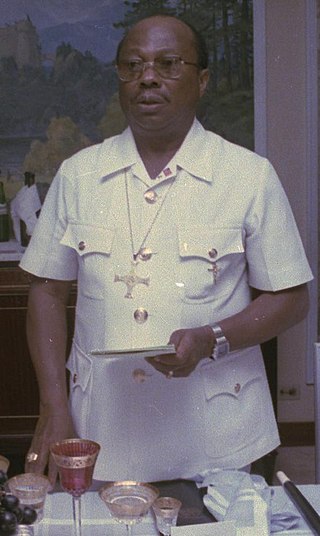
William Richard Tolbert Jr. was a Liberian politician who served as the 20th president of Liberia from 1971 until his assassination in 1980.

Monrovia ( is the capital and largest city of Liberia. Founded in 1822, it is located on Cape Mesurado on the Atlantic coast and as of the 2022 census had 1,761,032 residents, home to 33.5% of Liberia’s total population. Its Metro Area including Montserrado and Margibi counties largely being urbanized, was home to 2,225,911 inhabitants as of the 2022 census. As the nation's primate city, Monrovia is the country's economic, financial and cultural center; its economy is primarily centered on its harbor and its role as the seat of Liberian government.
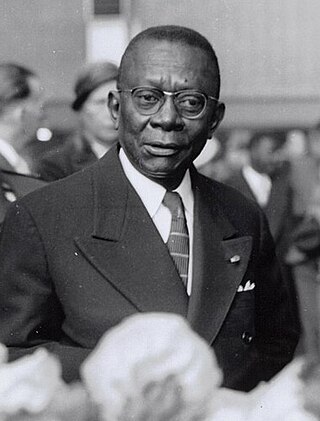
William Vacanarat Shadrach Tubman was a Liberian politician. He was the 19th president of Liberia and the longest-serving president in the country's history, serving from his election in 1944 until his death in 1971.
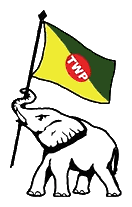
The True Whig Party (TWP), also known as the Liberian Whig Party (LWP), is the oldest political party in Liberia and one of the oldest parties in Africa. Founded in 1869 by primarily darker-skinned Americo-Liberians in rural areas, its historic rival was the Republican Party. Following the decline of the latter, it dominated Liberian politics from 1878 until 1980. The nation was virtually governed as a one-party state under the TWP, although opposition parties were never outlawed.

Maryland County is a county in the southeastern portion of Liberia. One of 15 counties that comprise the first-level of administrative division in the nation, it has two districts. Harper serves as the capital with the area of the county measuring 887 square miles (2,300 km2). As of the 2022 Census, it had a population of 172,202, making it the ninth most populous county in Liberia.
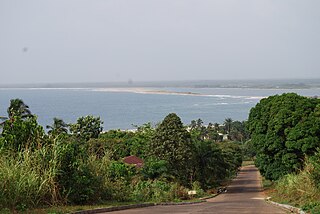
Robertsport is a town in western Liberia, about 10 miles from the Sierra Leone border. It is named after Joseph Jenkins Roberts, the first president of Liberia.

Cape Palmas is a headland on the extreme southeast end of the coast of Liberia, Africa, at the extreme southwest corner of the northern half of the continent. The Cape itself consists of a small, rocky peninsula connected to the mainland by a sandy isthmus. Immediately to the west of the peninsula is the estuary of the Hoffman River. Approximately 21 km (15 mi) further along the coast to the east, the Cavalla River empties into the sea, marking the border between Liberia and the Côte d'Ivoire. It marks the western limit of the Gulf of Guinea, according to the International Hydrographic Organization (IHO).

The Republic of Maryland was a country in West Africa that existed from 1834 to 1857, when it was merged into what is now Liberia. The area was first settled in 1834 by freed African-American slaves and freeborn African Americans primarily from the U.S. state of Maryland, under the auspices of the Maryland State Colonization Society.

The Catholic Church in Liberia is part of the worldwide Catholic Church, under the spiritual leadership of the Pope in Rome.

The Grebo or Glebo people are an ethnic group or subgroup within the larger Kru group of Africa, a language and cultural ethnicity, and to certain of its constituent elements. Within Liberia members of this group are found primarily in Maryland County and Grand Kru County in the southeastern portion of the country, but also in River Gee County and Sinoe County. The Grebo population in Côte d'Ivoire are known as the Krumen and are found in the southwestern corner of that country.
The McGill family of Monrovia, Liberia, was a free African-American family from Baltimore, Maryland, who emigrated to Monrovia in the 19th century. Among the early American settlers in Liberia, the McGills became established as one of the most prominent early Americo-Liberian families. Daguerreotypes of the McGill family can be found in the Library of Congress. Members occupied colonial offices, and they are mentioned in the African Repository magazine published by the American Colonization Society.
Crozierville is a town in Montserrado County, Liberia, along the Saint Paul River. Crozierville is notable for being one of the few Americo-Liberian settlements founded by immigrants from the Caribbean, instead of the United States.
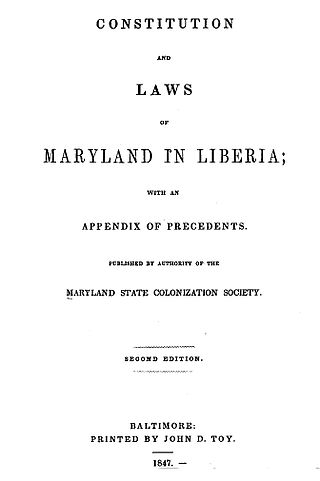
The Maryland State Colonization Society was the Maryland branch of the American Colonization Society, an organization founded in 1816 with the purpose of returning free African Americans to what many Southerners considered greater freedom in Africa. The ACS helped to found the colony of Liberia in 1821–22, as a place for freedmen. The Maryland State Colonization Society was responsible for founding the Republic of Maryland in West Africa, a short lived independent state that in 1857 was annexed by Liberia. The goal of the society was "to be a remedy for slavery", such that "slavery would cease in the state by the full consent of those interested", but this end was never achieved, and it would take the outbreak of the Civil War to bring slavery to an end in Maryland.

Ahmadiyya is an Islamic religious movement in Liberia. Founded in the year 1956, during the era of the Second Caliphate, the movement today represents an estimated 10% of the country's Muslim population. Approximately, this corresponds to 85,000 Ahmadi Muslims in Liberia. Current National President is Maulvi Naveed Ahmad Aadil.

The 1980 Liberian coup d'état happened on April 12, 1980, when President William Tolbert was overthrown and murdered in a violent coup. The coup was staged by an indigenous Liberian faction of the Armed Forces of Liberia (AFL) under the command of Master Sergeant Samuel Doe. Following a period of transition, Doe ruled Liberia throughout the 1980s until his murder in 1990 during the First Liberian Civil War.
Thomas John Jackson was an African-American former slave from Frederick County, Maryland, United States, who emigrated to Cape Palmas in the 19th century. Thomas Jackson was one of the most prominent early Americo-Liberian and was among the early American settlers of Liberia. Thomas Jackson is mentioned in the African Repository by the American Colonization Society and the Maryland State Colonization Society.

Americo-Liberian people, are a Liberian ethnic group of African American, Afro-Caribbean, and liberated Africans. Americo-Liberians trace their ancestry to free-born and formerly enslaved African Americans who emigrated in the 19th century to become the founders of the state of Liberia. They identified themselves as Americo-Liberians.

Squatting in Liberia is one of three ways to access land, the other two being ownership by deed or customary ownership. The informal settlement West Point was founded in the capital Monrovia in the 1950s and is estimated to house between 29,500 and 75,000 people. During the First Liberian Civil War 1989–1997 and the Second Liberian Civil War 1999–2003, many people in Liberia were displaced and some ended up squatting in Monrovia. The Ducor Hotel fell into disrepair and was squatted, before being evicted in 2007. In the early 2020s, over 9,000 Burkinabés were squatting on remote land and the Liberia Land Authority (LLA) announced a plan to title all land in the country.



















